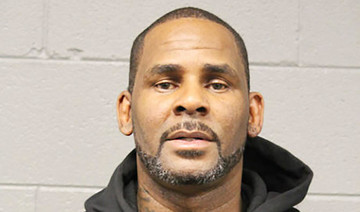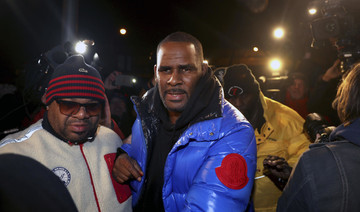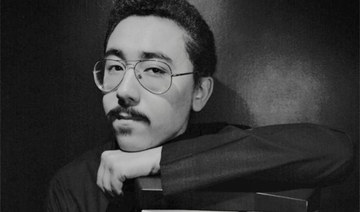CHICAGO: R. Kelly’s day began with a nationally televised broadcast in which he whispered, cried and ranted while pleading with viewers to believe him: He’d never had sex with anyone under 17 and never held anyone against her will.
The day ended with a trip to jail after the embattled R&B singer told a judge he could not pay $161,000 in back child support he owes his children’s mother.
Kelly no doubt hoped the raw interview aired Wednesday on “CBS This Morning” would help sway public opinion about the charges filed last month that accuse him of sexually abusing three girls and a woman. The interview was his first public defense since being charged and the first time he addressed allegations in the Lifetime series “Surviving R. Kelly,” which aired in January. The documentary alleged that he held women captive and ran a “sex cult.”
But experts said his appearance was also risky and could backfire if it gives prosecutors more information to use against him at trial. That’s why most defense attorneys urge clients to keep quiet.
“In my history as a prosecutor, I loved it when a defendant would say things or make comments about his or her defense,” said Illinois Appellate Judge Joseph Birkett, who said he did not watch the Kelly interview and was speaking only as a former prosecutor. “I would document every word they said ... (and) I could give you example after example where their statements backfired.”
There have been cases in which people who spoke up pointed to evidence that ultimately helped win their freedom, but, Birkett said, “historically it’s a bad idea.”
One recent example was “Empire” actor Jussie Smollett, who was charged with falsely reporting a racist, anti-gay attack in Chicago. In charging documents, prosecutors cited statements he made during an interview on ABC’s “Good Morning America” identifying two people in a still photo of the surveillance video as his attackers. Two brothers pictured in the photo later told police that Smollett had paid them to stage the attack because he wanted a raise and to further his career.
In Kelly’s case, he and his attorney might have decided they had nothing to lose after the Lifetime series, said Fred Thiagarajah, a prominent Newport Beach, California, attorney and former prosecutor.
“A lot of the public already thinks he’s guilty, and there is a very negative image of him, so the only thing he might think he can do is try to change their minds,” Thiagarajah said. If the evidence against him is overwhelming, “this kind of interview might be kind of a Hail Mary” to influence a potential jury pool.
But the dangers of such an interview might outweigh any benefits if Kelly locked himself into a particular defense, Thiagarajah said. “He may not know all the evidence against him.”
In the CBS interview, for example, he denied ever having sex with anyone under 17, even though he married the late singer Aaliyah when she was 15, and a videotape given to prosecutors in his current case purports to show Kelly having sex with a girl who repeatedly says she’s 14. Kelly’s attorney, Steve Greenberg, has said his client did not “knowingly” have sex with underage girls.
Thiagarajah said he might allow a client to do such an interview — but only if he were confident the client could keep his emotions in check and “stick to a script.”
“If you get someone who is ranting and raving, I would never let that kind of person ever do an interview,” he said.
On Wednesday’s broadcast, Kelly’s emotions swung wildly as he explained he was simply someone with a “big heart” who was betrayed by liars who hoped to cash in.
In a particularly dramatic moment, he angrily stood up and started pacing, his voice breaking as he yelled, “I didn’t do this stuff! This is not me!” He cried as he hit his hands together, saying, “I’m fighting for my (expletive) life.”
He insisted people were trying to ruin his 30-year career, but then said his fight was “not about music.”
“I’m trying to have a relationship with my kids and I can’t do it” because of the sex-abuse allegations, he shouted. “You all just don’t want to believe it.”
Hours later, Kelly went to the child-support hearing “expecting to leave. He didn’t come here to go to jail,” said his publicist, Darryll Johnson, who said Kelly was prepared to pay $50,000 to $60,000. He said Kelly did not have the whole amount because he has not been able to work.
A spokeswoman for the Cook County Sheriff’s Office said Kelly would not be released from jail until he pays the full child-support debt. His next hearing was scheduled for March 13.
After his Feb. 22 arrest in Chicago, Kelly spent a weekend in jail before someone posted his $100,000 bail. His defense attorney said at the time that Kelly’s finances were “a mess.”
Following the court hearing, the publicist said that the singer “feels good” about the TV interview.
CBS said it interviewed Kelly for 80 minutes. More of the interview is expected to air Thursday.
Interviews with two women who live with Kelly — Joycelyn Savage and Azriel Clary — also are set to air Thursday. Savage’s parents insist she is being held against her will. Kelly suggested during the interview that her parents were in it for the money and blamed them for his relationship with their daughter, saying they brought her to watch him perform when she was a teenager.
A lawyer representing the couple bristled at the allegation, saying Timothy and Jonjelyn Savage never asked for or received money from Kelly. The couple said they have not spoken to their 23-year-old daughter for two years and asked Kelly to make her available to talk to them.
“At no point did this family sell their daughter to anyone or provide their daughter for anything for money,” attorney Gerald Griggs said Wednesday during a news conference.
Kelly acknowledged in the interview that he had done “lots of things wrong” when it comes to women, but he said he had apologized. The singer blamed social media for fueling the allegations against him. He also said that all of his accusers are lying.
The 52-year-old recording artist has been trailed for decades by allegations that he violated underage girls and women and held some as virtual slaves. Kelly has consistently denied any sexual misconduct and was acquitted of child pornography charges in 2008. Those charges centered on a graphic video that prosecutors said showed him having sex with a girl as young as 13.
He has pleaded not guilty to 10 counts of aggravated sexual abuse.
Rising from poverty on Chicago’s South Side, Kelly broke into the R&B scene in 1993 with his first solo album, “12 Play,” which produced such popular sex-themed songs as “Your Body’s Callin’” and “Bump N’ Grind.” He has written numerous hits for himself and other artists, including Celine Dion, Michael Jackson and Lady Gaga. One of his best-known hits is “I Believe I Can Fly.”
R. Kelly in jail over child support
R. Kelly in jail over child support
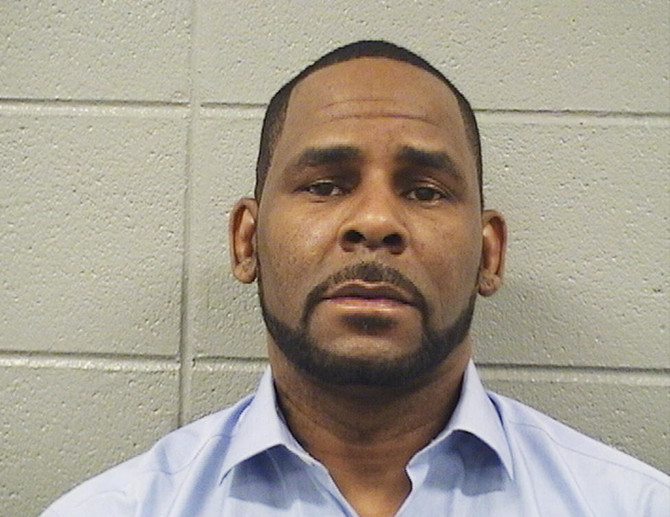
- The interview was his first public defense since being charged of sexually abusing three girls and a woman
- His next hearing was scheduled for March 13
REVIEW: ‘Returnal’ — a thoughtful and challenging sci-fi adventure
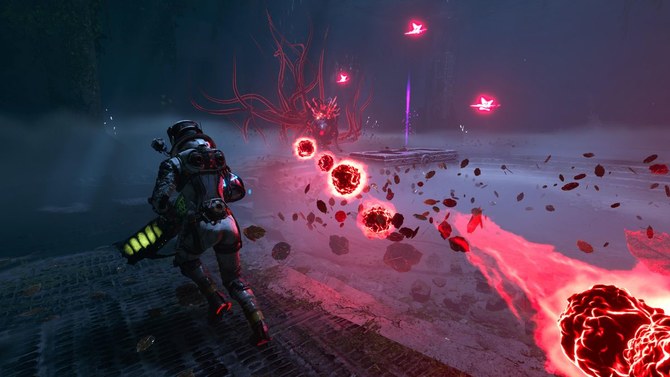
LONDON: Right from the start, before you even take control of Selene Vassos, a reconnaissance scout who has crash landed on a prohibited and mysterious planet, you are warned that “Returnal” (available originally for PS5 but now PC too) is “intended to be a challenging experience.” Such difficulty may deter the casual gamer used to a steady progression of character and exploration through a games environment. However, “Returnal” is a thoughtful and rewarding adventure that lays claim to much originality of thought in its set up. The key theme is that when you die, you return! But not to the same environment that you were in before. Instead, each new cycle postures new challenges and progress can only be made by unlocking upgrades that allow you to make more meta progress in Selene’s journey.
Selene herself is a super professional, unfazed character who doesn’t appear too bothered when she comes across a body of her former self that died in this strange world where the laws of physics and time appear not to apply. Staying alive is obviously crucial, particularly as it allows her to retain better weapons for longer. In addition, avoiding damage allows for boosts of agility, vision and more, making for a more lethal Selene. The environment is varied and surprising with each incarnation and the weapons on offer come complete with a range of exciting alternative fire mechanisms such as homing missiles or laser-like items. A hostile environment where even plants are a threat to life is mitigated by your technology, the core of which you can improve despite the reset of deaths, through fancy smart “xeno-tech” that becomes integrated with alien kit left around.
There is a paradox in “Returnal” described by Selene herself that she is trapped in an environment that is “always the same, always changing,” which literally makes no sense. Players have to be patient in the early chapters getting used to the sapping dynamic of death and return. Once that makes more sense, the loneliness of both her alien environment and the impossibility of even dying to escape it make for a pretty special atmosphere that a smart shooting engine then complements.
Artist Abdullah Al-Saadi represents the UAE at Venice Biennale
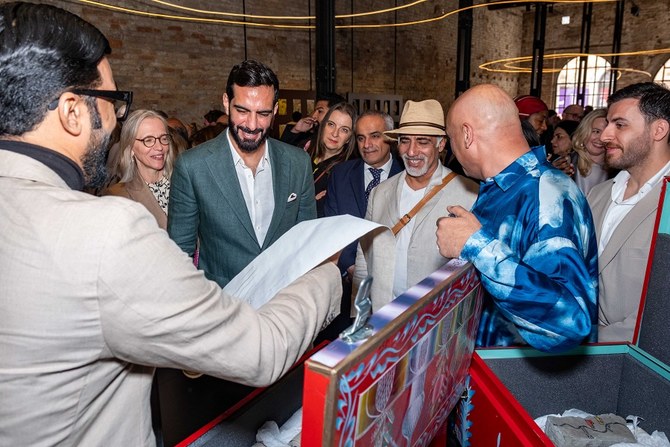
VENICE: Emirati conceptual artist Abdullah Al-Saadi is representing the UAE at the 60th Venice Biennale, curated this year by Adriano Pedrosa under the theme of “Foreigners Everywhere. Stranieri Ovunque.” The pavilion’s exhibition, which opened on April 20 and runs until Nov. 24, was curated by Tarek Abou El-Fetouh.
Al-Saadi has played a pivotal role in the development of the UAE’s evolving art scene — his multidisciplinary practice includes the mediums of painting, drawing, sculpture, performance and photography, as well as collecting and cataloguing found objects and the creation of new alphabets.
“Since I was a student, four decades ago, art has been an integral part of my daily life,” Al-Saadi said in a statement. “My art is the result of interactions with places, people, ideas, and aesthetics that I encounter every day where I live and in my journeys. I find myself driven to document these experiences visually or in written diaries and contemplations, seeking to transfigure the ordinary with the passage of time.”
“I am representing myself in Venice as an artist foremost and then as a local Emirati artist,” Al-Saadi told Arab News. “This pavilion will showcase my artistic journey over a long period of time since after university through eight works, two of which are new commissions,” he said of the ongoing show titled “Abdullah Al-Saadi: Sites of Memory, Sites of Amnesia.”
One of the artistic journeys he made that will serve as a new artwork took place amid the Arabian landscape.
“I spent seven days in the valley studying the tea, the coffee, and bread,” Al-Saadi explained to Arab News. “Then after one week I rode my bicycle, and I went to the mountains. During that time, I was reading a book on the Silk Road and trying to imagine how it was to travel on the Silk Road and I compared my way of traveling with how it was to travel on the Silk Road long ago.”
“Abdullah’s work is comprised of multiple aspects, from his diaries to sketches, to landscapes, scrolls and other objects that he creates,” Laila Binbrek, Director of the National Pavillion UAE, explained to Arab News. “They all stem from his diary — a diary he has been keeping for the last 40 years. Every day he writes in his diary.”
Christie’s Art of the Islamic and Indian Worlds auction highlights rare finds in London
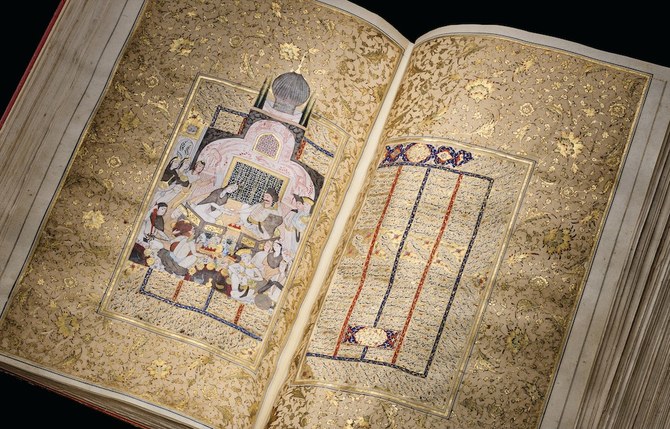
LONDON: Christie’s Art of the Islamic and Indian Worlds spring sale will see 261 lots —including paintings, ceramics, metal work, works on paper, textiles, rugs and carpets — go under the hammer at a live auction at their London headquarters on April 25.
Arab News was given an exclusive viewing of some of the works prior to their public pre-sale showing from April 21-24.
Sara Plumbly, Christie’s Head of Department for Islamic and Indian Art, gave her expert insights into some selected pieces.
These included lot 45, an exquisite miniature octagonal Qur’an, dated AH 985/1577-8 AD, which was made in Madinah, the Qur’an has an estimate of $13,000-19,000.
“We very rarely see manuscripts that were copied in the holy cities. So this being copied in Madinah makes it very rare,” she explained.
“It has a Naskh script. This a very steady, cursive script which is relatively easy to read — unlike some of the others. For example, Nastaliq script, which is copied on the diagonal, is much trickier to read. For Qur’ans you would almost always see a Naskh script for ease of reading. Nastaliq is usually reserved for poetic manuscripts,” she said.
This miniature Qur’an would be small enough to carry with the owner on a daily basis, usually around the neck. Alternatively, they would be hung in their silver boxes on an ‘alam (standard or flag) and carried into battle.
Plumbly, who completed her master’s degree in Islamic Art and Archaeology at the University of Oxford, has lived and travelled extensively across the Middle East and North Africa, including extended periods in Egypt, Syria, Lebanon, Saudi Arabia and Sudan.
Another stunning item in the sale is a Watercolor Album depicting a selection of known prestigious and rare Iznik ceramics from the Louis Huth collection. It comprises 44 single and double-page watercolor paintings of Iznik bowls, flasks, ewers and dishes.
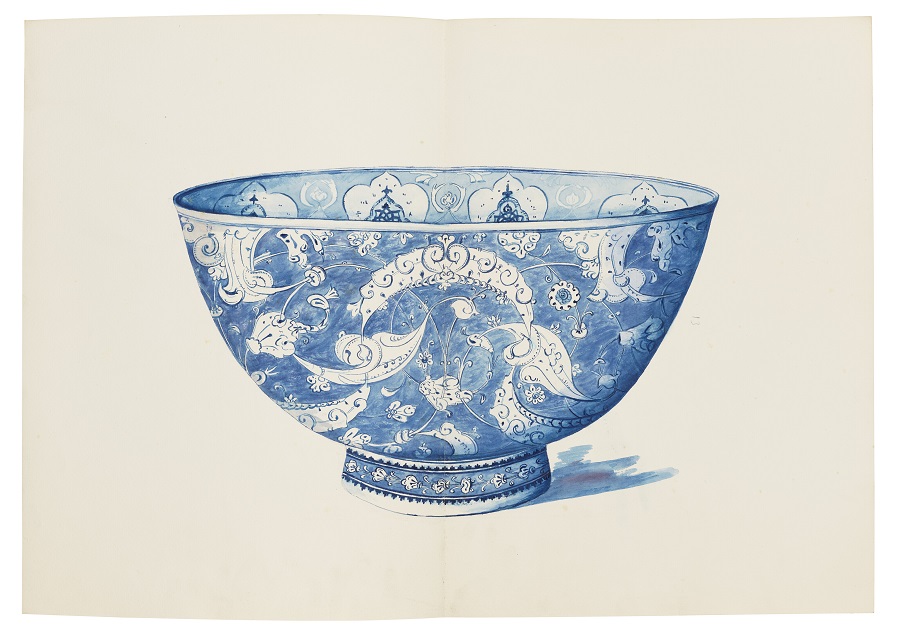
It was also fascinating to see a rare and complete illustrated manuscript copy of the Khamsa of Nizami by 12th century Persian poet Nizami Ganjavi, together with the Khamsa of Amir Khusraw Dihlavi, a 13th century Persian Sufi singer, musician, poet and scholar. The colors in the illuminations leap off the pages as though created yesterday.
Plumbly also pointed out the exceptional workmanship of an early 13th century Kashan pottery bowl, excavated in Iran’s Kashan in 1934.
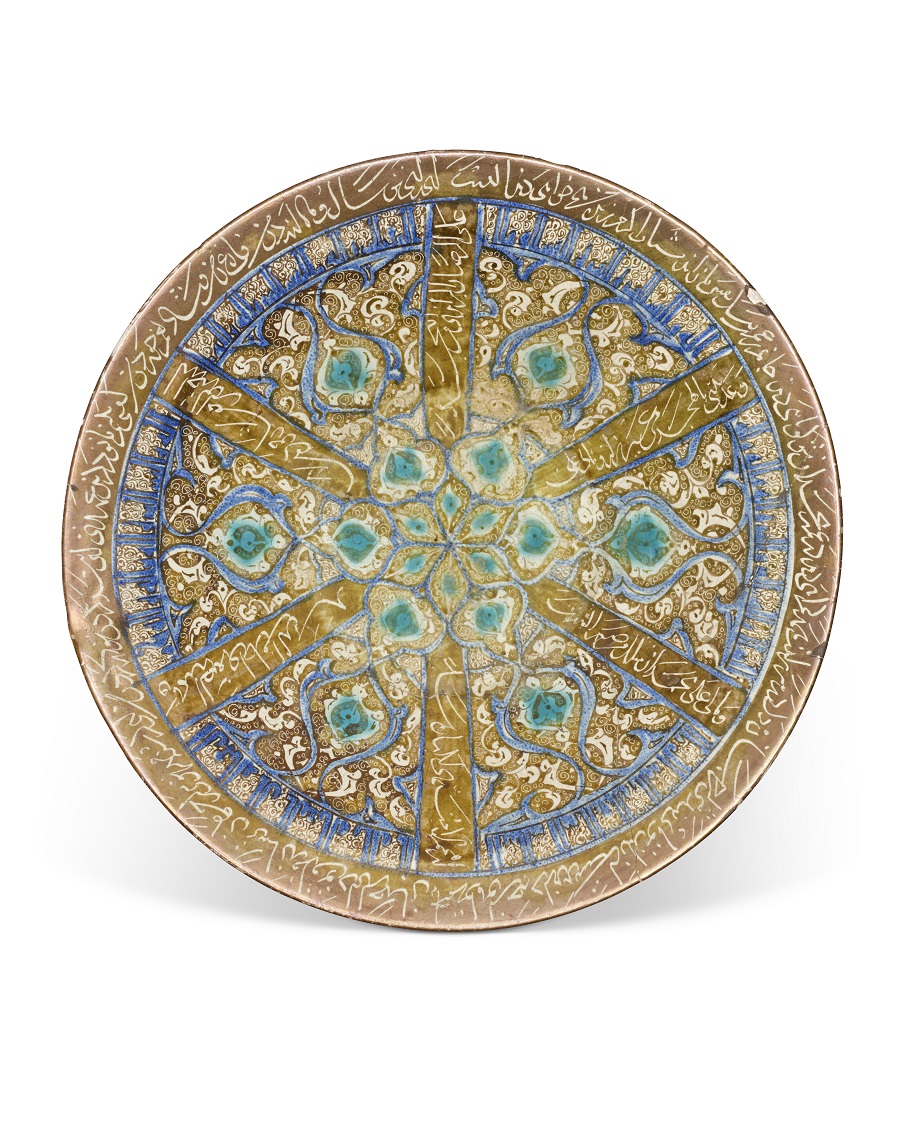
“This type of Kashan ceramics have a wonderful luster. It’s a very difficult technique to perfect. This bowl has a really beautiful dark gold color which is very well controlled. The condition is remarkable. It’s one of those ‘best of type’ objects,” Plumbly observed.
Merwas — Riyadh’s beating heart of creativity
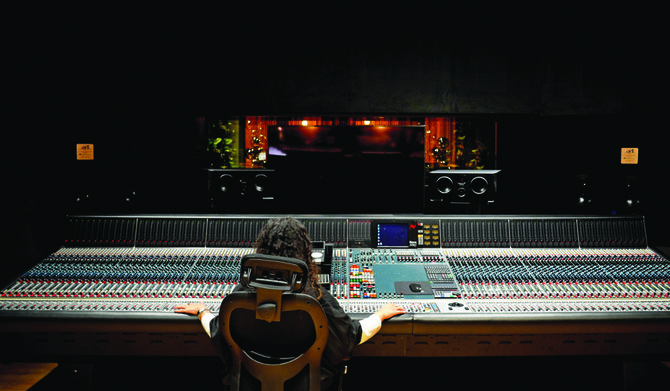
- World’s largest music production studio is nurturing Saudi talent, streamlining local industry
RIYADH: Riyadh’s Merwas, considered the biggest art and entertainment factory globally, is proving to be one of Saudi Arabia’s greatest music industry assets.
Nada Al-Tuwaijri, co-founder and CEO of Merwas, told Arab News that the facility, which holds the Guinness World Record for the largest music production studio, “is home to all artists.”
She added: “The methodology behind it is to create solutions through the subsidiaries, and invest in both talent and infrastructure.
“Alongside it being a one-stop shop for all content creators, we strive to take our local talents from local to global and create a unique stamp in the industry.”
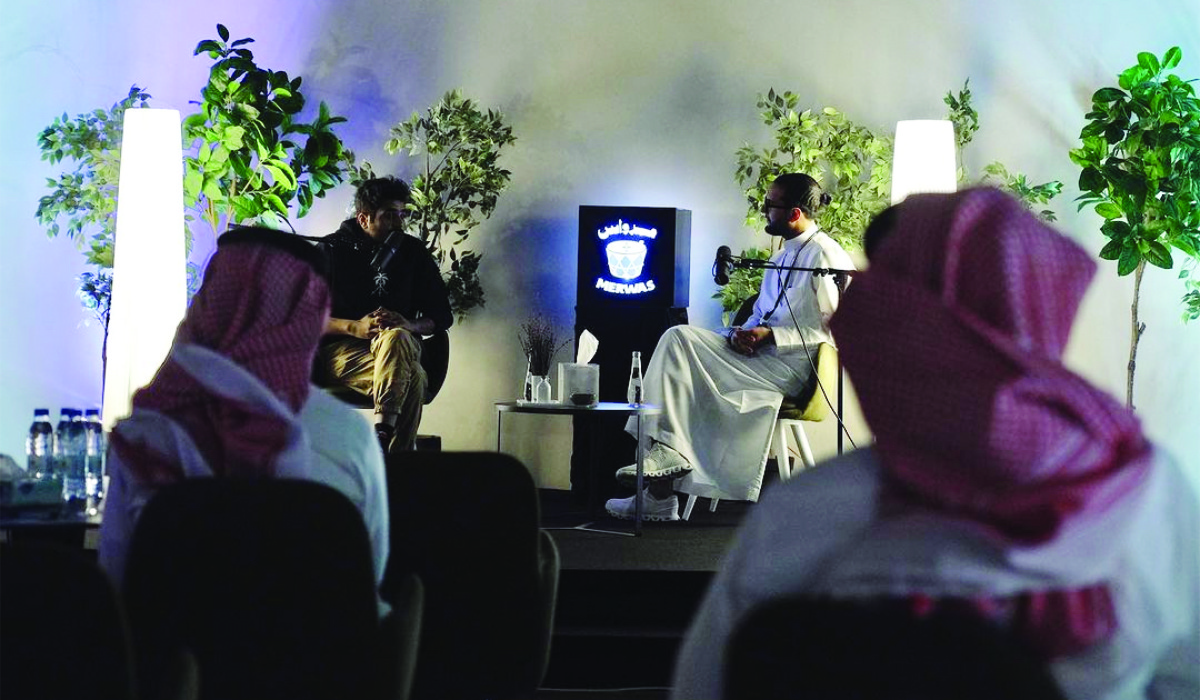
The entertainment zone and audiovisual production studio, located in Boulevard Riyadh City, houses 22 main studios alongside its academy.
Some of the top musicians in the world have visited Merwas since it opened in 2022. These include DJ Khaled, the acclaimed Saudi singer Rabeh Saqer, and the Emirati singer Ahlam. Afrojack, a world-renowned Dutch DJ and producer, also led an electronic music boot camp to nurture local talent and inspire a new generation of Saudi artists.
HIGHLIGHTS
• Merwas, located in Boulevard Riyadh City, houses 22 main studios alongside its academy.
• The academy’s classes offer local creatives and artists direct access to seasoned expertise.
• The Earth Sound Studio, or ESS, named after the late Saudi composer Talal Maddah.
Spread across almost 5,000 square meters, the culture factory fosters creativity, collaboration, and the production of multimedia content, while providing artists with access to top-tier services, facilities and industry expertise.
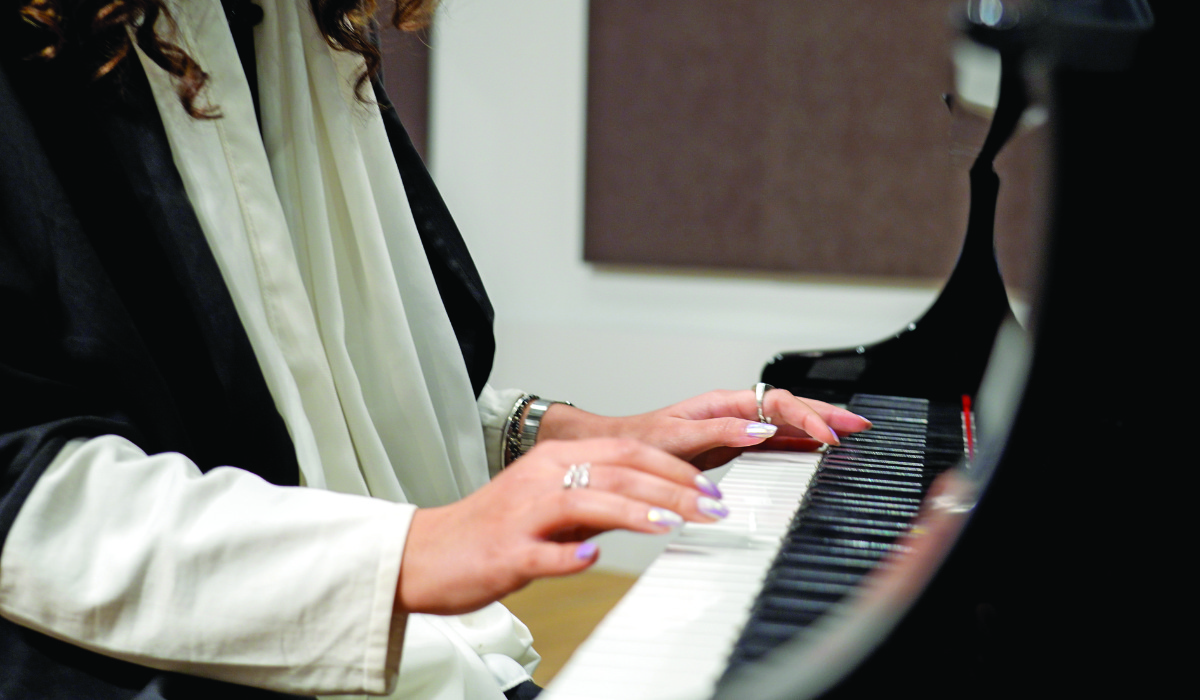
The Earth Sound Studio, or ESS, named after the late Saudi composer Talal Maddah, features state-of-the-art technology, such as the SSL console, which is used to create depth on music tracks and ensures the true soul of the artist’s voice is protected.
This live recording space is booked almost every day by various artists, and has been used by some of the Arab region’s biggest stars.
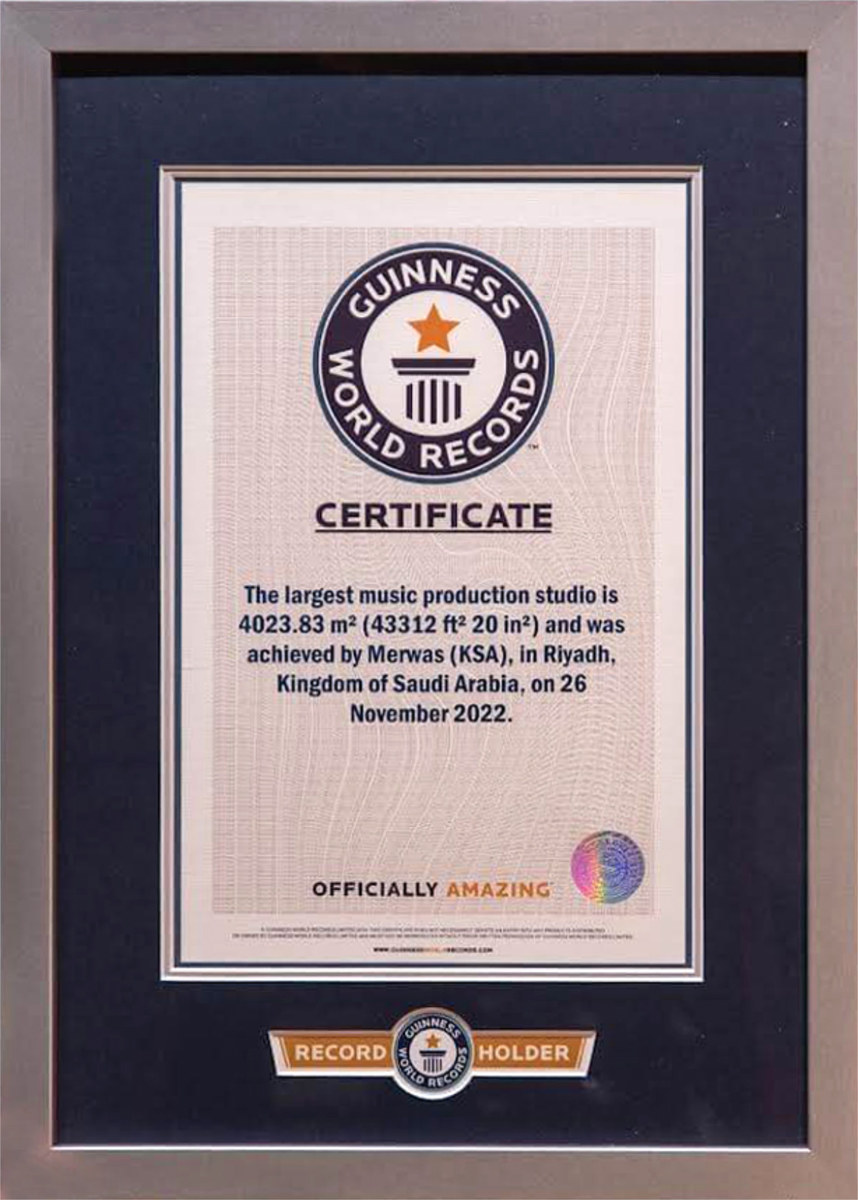
One of the only five Neve consoles in the world can be found in the Neve Studio. The panel is known for its high-quality sound and warmth, and is ideal for music recording, vocal tracking, and mixing for exceptional audio quality.
Its live studio can accommodate over 120 orchestra members and their instruments to provide a unique recording experience.
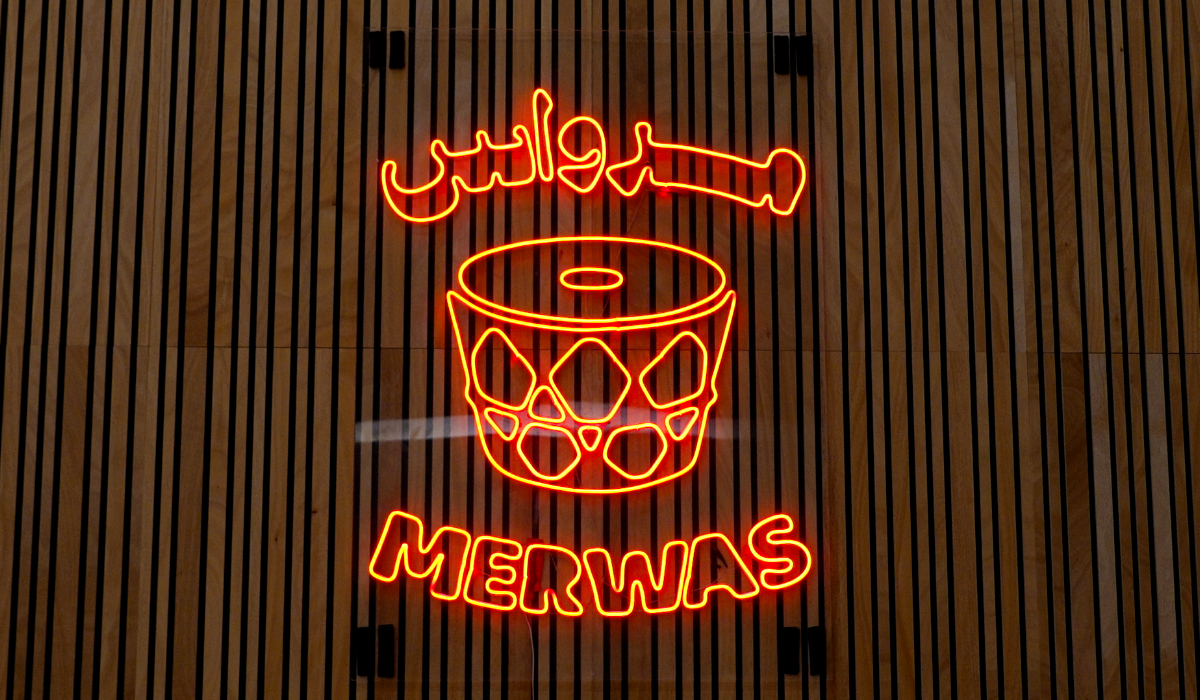
Specifically designed for electronic music production, the EMP Suite is a DJ’s dream, with cutting edge synthesizers and digital audio workstations ensuring an artist leaves the room with a fully produced track.
Merwas is also home to three production suites, designed for content creators who require a comfortable and professional environment for music production, editing, and mixing. Each suite is equipped with industry-standard gear, software, and acoustics to support a wide range of projects.
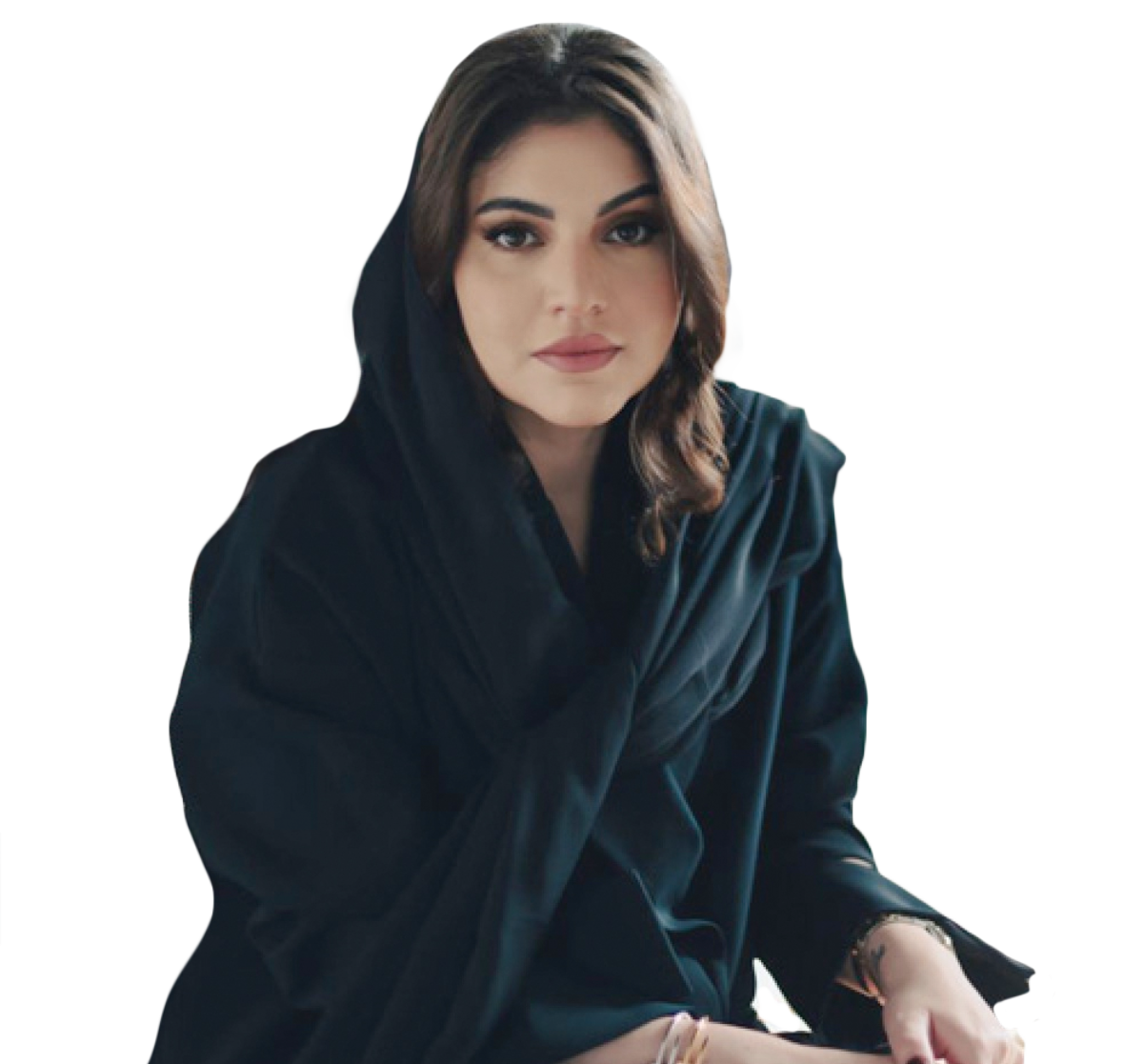
The studio also provides private rehearsal spaces to ensure Saudi talents are nourished to their full potential. The versatile space is designed for musicians, performers, and other artists to rehearse and refine their craft within a comfortable environment with access to instruments and equipment.
Part of the charm of recording studios is the live jam sessions that have given birth to some of the most iconic records to date. Merwas’ Band Live/Control Room also captures the spontaneity of live performance within its soundproof walls.
Alongside (Merwas) being a one-stop shop for all content creators, we strive to take our local talents from local to global and create a unique stamp in the industry.
Nada Al-Tuwaijri, Merwas cofounder and CEO
Championing audiovisual pursuits, the studio has made space for high-quality podcasts and videos to come to life.
The podcast suite and FM radio recording spaces are tailored to immerse listeners with unbeatable audio clarity, while the 25-meter-long Green Screen room helps ideas come to life, whether commercial, film, or music video.

Material can then be edited at the color-grading suite, which is essentially a small theater with 4K projector. Producers, directors, writers, and engineers gather here to put the final visual touches on video projects through its DaVinci color grading software and hardware.
Academy Classes offers local creatives and artists direct access to seasoned expertise. These feature advanced stations for sound production, engineering, and technical programs, with everything necessary for a basic understanding and training of music production.
The studio hosts workshops, networking sessions, and community events in an effort to flourish the music industry locally while making it a magnet for international talent. Anyone can be a part of this community by booking a suite or signing up for a workshop on their website merwas.sa.
Merwas has positioned itself at the the forefront of the entertainment industry being the first of its kind in the MENA region. In less than a year since its launch, it has already became a hotspot for musicians across the globe to visit and utilize its services, from rising talents to international A-listers.
Founded by Al-Tuwaijri and Chief Content Officer Rumian Al-Rumayyan in partnership with Sela, Merwas treasures Saudi creativity and is a vital part of building an ecosystem and community for local artists.
Their partnership with the Saudi Authority for Intellectual Property has set a new focus on preserving the rights of local creatives, pillared by the aim to enrich the culture of the Kingdom while empowering its citizens and their creativity in an environment of abundant knowledge, education in culture, art, entertainment and music.
Hollywood Arab Film Festival: Showcasing Arab cinema in Los Angeles
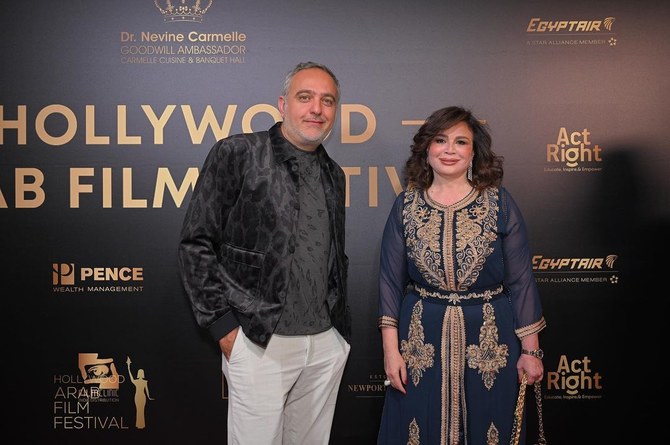
LOS ANGELES: The third annual Hollywood Arab Film Festival began this week, bringing the best of 2024’s Arab cinema to Los Angeles and giving fans a chance to see the films in theaters as well as introducing a new audience to the Arab world’s top talent.
The event, which runs until April 21, was attended by a number of celebrity guests including Egyptian producer and screenwriter Mohamed Hefzy, Tunisian actor Dhaffer L’Abidine, renowned Egyptian star Elham Shahin and Egyptian producer Tarek El-Ganainy.
At the event, Hefty said: “Arab cinema really needs a platform to tell our stories and to show who we are, our identity, our hopes and dreams, our pains, and all the different social topics that are tackled in some of the films that are being presented are maybe more relevant today than ever. So I think it’s a great opportunity to have this dialogue.”
Hefzy’s film “Hajjan” was showing at the event. It is a Saudi Arabia-based film directed by Egyptian filmmaker Abu Bakr Shawky.
“Hajjan is a film about a young boy who got a very special connection to his camel, who has a brother who was a camel jockey and races,” Hefzy said. “And, one day when something really unexpected happens to his brother, and shatters his world, it forces him to step into his brother’s shoes and become a camel jockey, and so starts racing himself.”
The movie is a co-production between the Kingdom’s King Abdulaziz Center for World Culture, or Ithra, and Hefzy’s Film Clinic.
“It was a film made in Saudi Arabia with Saudi talents and actors with an Egyptian director, but with the Saudi co-writer and Saudi actors and shot mostly in Saudi Arabia,” Hefzy said. “So I think it’s, it was a great experience, and learned a lot about Saudi Arabia, learned a lot about the culture.”
The festival featured cinema from various Arab countries, presenting films from 16 different nations. Marlin Soliman, strategic planning director of HAFF, highlighted the inclusion of six feature films, ten short films and six student films.
Spanning five days, HAFF offered its audience a vibrant experience, including a red-carpet affair, panel discussions on filmmaking and diversity in Hollywood, and, of course, screenings of high-profile films.
The festival also saw several filmmakers singing the praises of Saudi Arabia’s expanding film industry.
L’Abidine, the writer and director of “To My Son,” said: “I’m thrilled to be back again with my second feature film ‘To My Son,’ a Saudi film… I think there is a great evolution of Saudi cinema that’s been happening in the last few years.”


